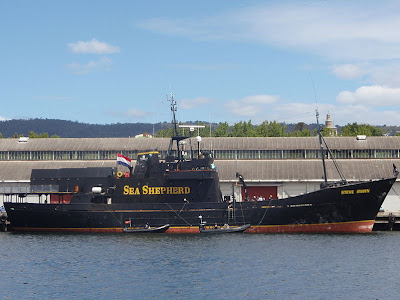Whale Wars focuses on your efforts in the Antarctic region dealing with Japanese whaling fleets. Where does whaling stand now? Is it legal to hunt whales, illegal, a gray area?
All commercial whaling was ruled illegal in 1986 by the International Whaling Commission. So commercial whaling is illegal. What Japan is doing though is they're targeting endangered whales in an established international whale sanctuary in violation of that commercial moratorium. And they're in violation of the Antarctic Treaty, the convention of the International Trade of Endangered Species, and they're also in contempt of the Australian Federal Court, which ruled they couldn't take whales in the Australian Antarctic Territory.
So what they are doing is blatantly illegal. All we are doing is intervening to uphold the international law because governments don't have the economic or political will to do that.
How are the whales killed?
Whales don't really have a chance. These are highly mechanized industrial fleets. They go out there, they locate the whales with sonar, they outrun them with their fast harpoon boats, and they drive explosive harpoons into their backs. This last season on Whale Wars we saw one whale that was harpooned, and stayed with it until it died. It was 25 minutes that it was thrashing about after it was harpooned, after they fired high-powered rifles into its body.It's an extremely cruel enterprise. If this was a land animal it would not be accepted. This kind of stuff wouldn't be accepted in any slaughterhouse in the world. And this is one of the most social, highly intelligent, and sensitive creatures on the planet, and we are allowing this kind of massacre to take place every year.
Clearly there may be more than economics in question here. Is this a pride issue? Is it sort of a national identity thing, to be able to continue to hunt and eat whales?
That is part of it, but they're still illegal. The Japanese say that it's a tradition. But it isn't. Commercial whaling was introduced to Japan in 1946 by General Douglas MacArthur. It was an American imposition. So it's hardly traditional. But they're saying that if we stop them from whaling, the we'll stop them from taking bluefin tuna. They think it's a foot in the door to stopping their entire fishing operation. So they feel that they have to defend this in order to prevent us from going after their other operations.
The fact is that the oceans are dying, and those countries like Spain and Japan and China that are destroying life in the oceans are contributing to the demise of the oceans. And really this is something that all people should be involved in. I know it's abstract, but the fact is that if the oceans die, then we all die, and civilization ceases to exist.
I don't think people really have connected the dots there, but a little bit of thought into it and they'll realize that we've wiped out 90 percent of the commercial fisheries on this planet right now. We're killing about 70 to 90 million sharks every year, we're wiping out the fisheries, we're wiping out whales, we're wiping out seals. This kind of destruction is going to lead to very serious consequences for human beings.
Tell me about your crew. What kind of people are on board the Steve Irwin, and where they come from? Do they get paid?
My crew are men and women from all different nationalities—anywhere from 10 to 14 different nationalities—and they're all volunteers. I couldn't pay people to do what these volunteers do. They risk their lives, they're out there, they're passionate. People complain the Sea Shepherd's crew is amateurish, they're not professionals. I couldn't go down there with professionals—professionals wouldn't do what my crew does. I want people who are ready to stand up and risk their lives.
This is the Sea Shepherd vessel:








No comments:
Post a Comment